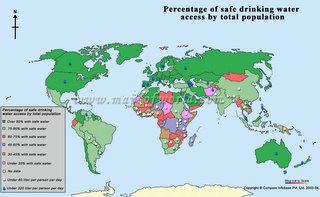 Inter Press Service bericht: 'WATER:Services in Public Hands Gaining Popularity. Publicly supplied water costs consumers 50 percent less than water controlled by private firms, and management could be more efficient, say activists and local authorities. With that argument, they are doing everything they can to stop the expansion of foreign companies in the water sector. Successful examples in cities of Argentina, Brazil, Ghana, Japan and Venezuela, among others, where water and sanitation are in the hands of the national or local government, are the banner waved by those who believe that nobody should be treating this essential resource as a business. But the cases of water privatisation are in the minority worldwide, and it is in state hands where most of the water distribution problems emerged -- now affecting millions of people. Silvano da Costa, president of Brazil's National Association of Municipal Sanitation Services; Julián Pérez, leader of the Federation of Neighbourhood Councils in the western Bolivian city of El Alto; and André Abreu, delegate from France's Danielle Mitterrand Foundation, are just some of the staunch defenders of publicly controlled water services. The three, in attendance at the 4th World Water Forum in Mexico City, Mar. 16-22, said in conversations with Tierramérica that the privatisation of water, much touted in the 1990s, was a failure worldwide.' Lees verder: http://www.ipsnews.net/news.asp?idnews=32594 Reuters bericht: 'Waterborne diseases kill four children a minute, the U.N. children’s agency said as activists urged the world to improve water safety for some 400 million children. The call came from young campaigners meeting at the Children’s World Water Forum (CWWF) in Mexico City.
Inter Press Service bericht: 'WATER:Services in Public Hands Gaining Popularity. Publicly supplied water costs consumers 50 percent less than water controlled by private firms, and management could be more efficient, say activists and local authorities. With that argument, they are doing everything they can to stop the expansion of foreign companies in the water sector. Successful examples in cities of Argentina, Brazil, Ghana, Japan and Venezuela, among others, where water and sanitation are in the hands of the national or local government, are the banner waved by those who believe that nobody should be treating this essential resource as a business. But the cases of water privatisation are in the minority worldwide, and it is in state hands where most of the water distribution problems emerged -- now affecting millions of people. Silvano da Costa, president of Brazil's National Association of Municipal Sanitation Services; Julián Pérez, leader of the Federation of Neighbourhood Councils in the western Bolivian city of El Alto; and André Abreu, delegate from France's Danielle Mitterrand Foundation, are just some of the staunch defenders of publicly controlled water services. The three, in attendance at the 4th World Water Forum in Mexico City, Mar. 16-22, said in conversations with Tierramérica that the privatisation of water, much touted in the 1990s, was a failure worldwide.' Lees verder: http://www.ipsnews.net/news.asp?idnews=32594 Reuters bericht: 'Waterborne diseases kill four children a minute, the U.N. children’s agency said as activists urged the world to improve water safety for some 400 million children. The call came from young campaigners meeting at the Children’s World Water Forum (CWWF) in Mexico City.UNICEF, which helped organise the conference, said children paid the highest price in a world where over 1 billion people do not have safe water and one in three lacks a basic toilet.
"Waterborne illness kills a child every 15 seconds and underlies much of the world’s disease and malnutrition," UNICEF's executive director Ann Veneman said in a statement on the eve of World Water Day (March 22). "Solutions to the world water crisis must ensure that children survive, thrive, learn and live in dignity." Diarrhoea alone kills 4,500 children every day - the second highest single cause of childhood deaths. Waterborne diseases also mean many children are missing out on education which in turn reduces their chances of escaping poverty.' Lees verder: http://www.alertnet.org/thefacts/reliefresources/114297179713.htm




Geen opmerkingen:
Een reactie posten